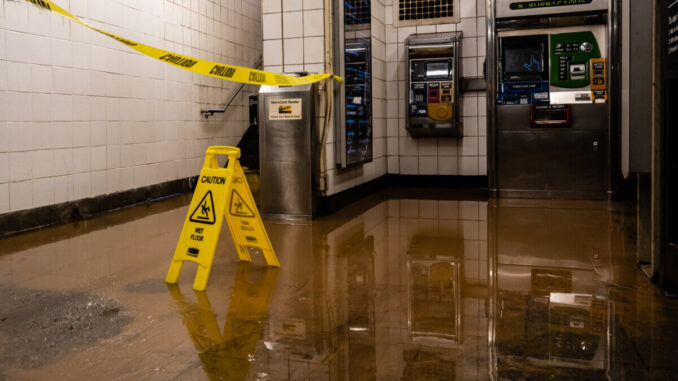
By Shea Stevenson
When I was a kid, I thought I should move to Brooklyn so I could be there for at least a while before it goes underwater. The other day (Sept. 29) there was some flooding across the city, and the only way I had to interface with that was that the subways weren’t running. There is an heir of detached finality to living in New York City now, or that’s what I’ve anecdotally gathered from my peers. Once in a while, an orange cloud descends over Times Square or blots out your view of the Brooklyn Bridge and all you can do is stay inside and keep your windows shut. It’s an easy time to be an apocalyptic thinker. Then again, is it ever hard to be?
The vibe is that eventually our hurricane will come, one that makes vast swathes of the city unlivable and forces a radical shift in infrastructure. In other words, the city can’t survive whatever is happening to the water it sits on, but the people will, so it’ll wind up changed. But I don’t know. This is how disasters are, how we feel now. Life will not stop to indicate the curtain call because nothing is ending. Rather, the subways won’t be running, or the sky will be red, and we will think, “Huh, that’s unusual.” But mostly we will stay inside. The disaster started in the 1800s (perhaps earlier), and is ongoing.
It seems like a totally disparate problem, but the end of the writers’ strike gives me hope for a better future. A massive, high-profile strike, where one of the most visible forms of labor can flex its real power and pull in other unions/guilds has been a pleasure to see play out in real time. The auto workers union is on strike and the president of the United States was on the picket line with the strikers. The president on a picket line! That’s nice! But what does that have to do with the flooding?
Anti-capitalist (or rather pro-labor) movements must be central to any broad-scale effort against climate change. Without it, we have only performance and band aids. It is not a coincidence that the rise of global industrial capitalism has led to widespread ecological collapse; when the assumed stance of global capitalism is one of infinitely expanding profits (read: infinitely expanding extraction) on a finite planet, this is where that leads. Regulations be what they may, as long as each company is fundamentally incentivized to reap more than can be sown, we will be trapped in a death spiral.
Labor movements can stem that tide. A world in which workers are treated fairly across the board is necessarily also a world in which the environment is not nearly so devastated. If workers (mostly outside the USA, but under the USA’s colonial money-power) weren’t exploited, if the people who lived in a place had the final say in what was extracted from it, all of this would be different. You wouldn’t get bananas when they’re out of season. Clothes would be more expensive. But you’ll live; in fact, I wager you’ll live longer.
It’s easy to be pessimistic about the world ending, but to look around at the state of labor and civil rights movements recently, the immense (and growing) political unrest is reassuring. The actors are still on strike, the auto workers have only just gotten started, and UPS workers got very, very close to going on strike recently (only stopping because they got their deal without it). The power is there, if we’re willing to take it.
